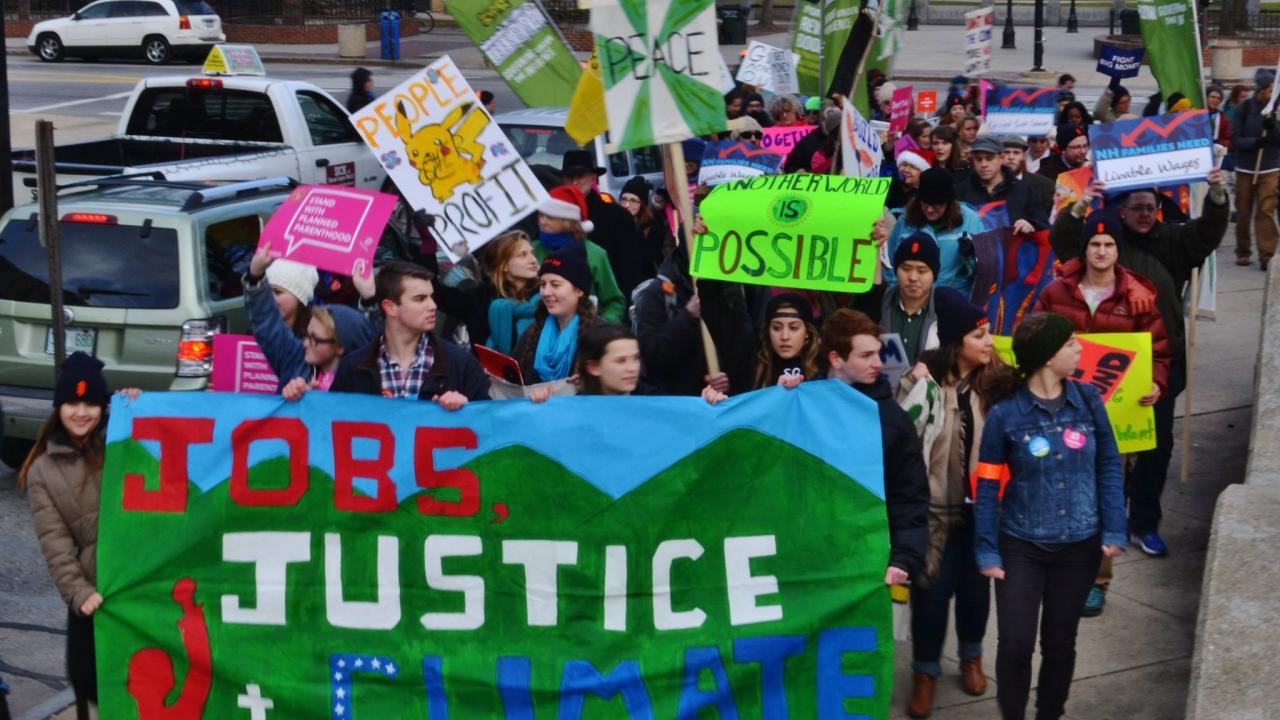What a time to start an organization called Rights & Democracy (RAD). Seems like three decades of political movements have been crammed into these past five years in Northern New England. Thousands of volunteers have knocked on doors to talk about a political revolution. We’ve held the largest political rallies in Vermont’s history to resist the Trump administration. Students have organized massive climate strikes. And nearly all of our predominantly white rural towns have held their first racial justice rallies in solidarity with the uprisings for Black lives.
We launched RAD in 2015 in Vermont and New Hampshire as a multi-issue, multi-tactical organization focused on building a movement that connects the struggles for economic, social, racial, and climate justice. In this current moment, we are working with our partners to directly confront our four interconnected crises: the COVID-19 pandemic, unemployment, climate change, and our country’s foundational crisis, systemic racism. We are constructing durable grassroots political infrastructure to give rural communities the tools they need to meet today’s challenges and get at the roots of these crises.
Here are our five core strategies:
-
Go bold: Part of our challenge is to raise expectations of what is possible during these difficult times. To do that, we are going to have to teach ourselves and our communities to dream big about what our democracy can look like and envision a future where everyone can truly thrive. We see fighting for transformational policies as a core strategy, a means of counteracting the game plan of elites to foster apathy and make any efforts to create change seem futile. By focusing on real solutions, we give our members something worth fighting for, worth coming to a meeting after a long day’s work, or worth giving up a precious weekend to knock doors in frigidly cold weather.
-
Go big: Our theory of change requires us to build a mass base of members and supporters in order to impact elections and create political mandates around bold policy solutions. This means we always have to be talking to new people and inviting them to join us. With COVID, we have replaced knocking on tens of thousands of doors with making hundreds of thousands of phone calls and texts and following it up with lots of digital engagement. We are now layering on relational organizing with the support of Organizing Empowerment. We need a mass base so we can communicate with a meaningful number of people to remind them to vote and make sure they know how to request an absentee ballot, to encourage them to send an email to their legislator, and to find lots of people who can send us a small contribution to sustain the work.
-
Go deep: In our small rural states, we are limited in how many staff we can employ, so our model requires us to build a deep base of core leaders who will help carry out this work. We provide clear and meaningful roles and opportunities for people to develop their political analyses. We teach our leaders how to do everything from having organizing conversations to facilitating meetings to holding candidate forums. We also invest in the political development of our leaders by holding strategy retreats (which used to be on campgrounds but, like everything else, are now on Zoom). For us, deep organizing means focusing on the most impacted communities. In our region, many struggle with poverty; nearly one in ten people live in manufactured homes. Manufactured housing is often built in flood plains and, in 2011, Tropical Storm Irene devastated these communities. With the support of MHAction, we have begun reaching out to individuals in these communities to invite them to join our RAD regional chapters to take action on housing rights, climate justice, minimum wage legislation, and the overdose crisis. By developing leaders most impacted by the crisis, we can shift the narrative on what solutions are needed.
-
Changing policy makers: Some of our leaders go on to run for elected office. In rural areas, people can often get elected for town selectboard, city council, or even the state legislature by raising only a couple thousand dollars. We have come to realize that we need elected officials who actually come out of our movements and who represent our most impacted communities. We have also learned that it is just as important to help them thrive as elected officials. Over the long term, our aim is to help leaders on the school board or city council run for Congress or Governor.
-
Connecting our struggles beyond our borders: When RAD started out, most of our work focused on building statewide power and state legislative changes. Now we understand that, while our work must have strong local roots, we can build greater momentum by linking it with a broader regional strategy. Small rural towns are not able to establish universal health care or phase out fossil fuels, but we can fight to pass the school budget, win harm reduction policies to deal with the opioid crisis, and shift resources from over-policing to community health. Looking beyond our region, the interconnected crises we face have highlighted both the necessity and power of working for federal-level policy solutions. While the local level is still where we can make the biggest impact, many of the bold solutions we need must be implemented at the state or federal level. This has been especially apparent during the COVID-19 pandemic when federal policies are so clearly crucial for our local economy. In the first five months of the pandemic, RAD leaders had more contact with our federal congressional staff than we had in the previous five years. We have also been able to send leaders to join their counterparts across the country in DC to fight back against attacks on the Affordable Care Act. These large-scale actions deepened our leaders’ commitment to the fight; they returned feeling part of something much bigger.
We had already started moving in this direction even before the pandemic. In January 2020, Rights & Democracy helped to found the Renew New England Alliance, a regional coalition of more than fifty labor unions, racial justice organizations, Abenaki tribal leaders, environmental advocates, frontline communities, and people’s movement organizations focused on advancing a comprehensive policy agenda modeled on the Green New Deal framework. This new and growing coalition planned a series of visioning sessions to help us identify what kinds of policies we need to meet the needs of our region around food, housing, care, and the environment.
The nucleus of the Renew regional plan is a Jobs Guarantee, which will ensure that everyone who can work and wants a job will have one. We are working with our partners in other New England states to launch the Jobs Guarantee by supporting the development of unionized jobs in sustainable industries and new public employment initiatives designed to modernize our region’s infrastructure and decarbonize the economy. We have been working to elect over one hundred state representative and state senate candidates who signed onto the Renew vision. We are also building a Political Leadership Institute to work with movement-elected officials who will co-lead these fights with us.
This state-level work is connected to federal strategy. We are part of the national Green New Deal Network, which includes the two national organizing networks that RAD is affiliated with: the Center for Popular Democracy and People’s Action. We joined in the demand for a People’s Bailout and are now part of the push for the federal THRIVE Agenda. As part of this network, Rights & Democracy participates on the national policy platform committee and on the national leadership team for the People’s Action Green New Deal Frontlines cohort.
One massive challenge we face in building a political mandate for change is combating the rise of anti-immigrant and racist organizing that has exploded in New England states. Between 2018 and 2019, incidents of white supremacist propaganda increased nearly tenfold across New Hampshire and Vermont. While it is fairly easy to find anti-racist organizing in New England college towns, in many less visible, rural areas, RAD is often one of the only organizing groups other than white supremacists. This year, Rights & Democracy has devoted significant field resources to deep canvassing and relational organizing campaigns using a race class narrative. The strategy for this rural organizing work is to shift support away from right-wing narratives that masterfully employ “dog-whistle politics” to divide the racially and ethnically diverse working class. Instead, our organizers are having in-depth conversations with primarily white working-class communities to move them to support racial justice, investment in public goods and local economies, and union jobs. We are working to establish a year-round field program to shift public sentiment, build our base, and recruit leaders for our regional chapters. Prior to the pandemic, all of this work happened in person — by staff and volunteers knocking on doors. While the shift to the digital sphere came with a steep learning curve, we have had extraordinary success in phone canvassing campaigns with strong text and digital follow-up engagement.
To make meaning of the crises we face and develop the next generation of leaders, we have held virtual strategy sessions and workshops with our leaders. Notably, shifting to online sessions has increased the participation among our working-class leaders, who previously may have missed events because of travel time, caregiving, and other family commitments. Building relationships online is not always ideal, but in rural communities we have found that digital organizing allows us to regularly connect our leaders across regions for them to build stronger bonds together.
In this time of social distancing, we recognize that creating these bonds is the most critical element of our work. With so many forces trying to isolate us and with daily news that reads like a sci-fi dystopia, it is critical for us to cultivate a new generation of leaders who, even in the darkest of times, can reimagine a thriving future for rural communities. Together, we are building a model of a people-powered organization to get us there.

